Home | Major Sporting Events | Olympic Games
2010 Olympic Winter Games - Vancouver
PreviousNext
The 2010 Olympic Winter Games, held in Vancouver, British Columbia are celebrated as a high water mark in the history of Canadian sport and culture. Following the longest domestic Torch Relay in Olympic history, and opening ceremonies that powerfully evoked Canada's distinctive natural and cultural landscapes, the competition brought together hundreds of thousands of spectators and revelers, constantly filling the streets of Vancouver with boundless energy and optimism. Sharing these emotional images via social media, Canadians everywhere fell in love with the way the Olympic spectacle reflected a vibrant, confident nation discovering its own potential to inspire and excite.
Staging the Olympic Winter Games in Vancouver's temperate coastal rainforest climate meant organizers were well prepared to overcome challenges posed by warm weather and a lack of snow at venues like Cypress Mountain. Having already formed creative contingency plans and preserved emergency stores of snow elsewhere, volunteers helped build up courses for cross country and alpine ski events with straw bales and wood placed under a thin layer of stockpiled snow hastily trucked in to ensure competition proceeded without delay.
Canadian athletes were also well prepared, and together they achieved unprecedented success on home soil during the 2010 Olympic Winter Games. Many homegrown competitors benefitted from the "Own The Podium" initiatives that had provided more specialized training to elite Canadian athletes leading up to Vancouver 2010. For the first time, Canada ascended to the top of the podium while hosting the Olympic Games, ultimately collecting 14 gold medals. In doing so, Canadian athletes set a new record, winning the most gold medals ever for a single nation at an Olympic Winter Games.
Alexandre Bilodeau won the first gold medal by a Canadian on home soil when he won the men's moguls event. Skiing under immense pressure, the executed two superior back flips to record an overall score of 26.75 points.
Joannie Rochette performed under difficult circumstances and displayed immense courage. Only two days before the women's figure skating short programme she received the devasting news of her mother's death. With the emotional support of an entire nation, Rochette competed and captured Olympic bronze.
Finally, befitting a hockey-mad host nation, the excitement surrounding the Olympic spectacle in Vancouver peaked when the Canadian Women's Olympic Hockey Team won a gold medal that was quickly matched by the Men's team in a thrilling overtime victory over their American rivals. This achievement exuberantly concluded the 2010 Olympic Winter Games, bringing Canadians together from coast to coast in a moving celebration of national unity and pride.
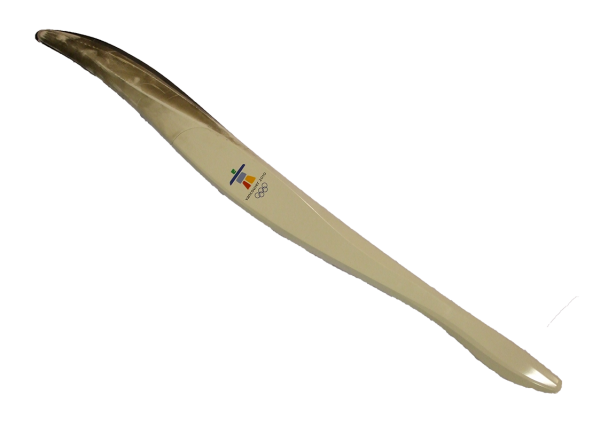
The relay torch for the 2010 Olympic Winter Games in Vancouver had a curved shape to represent a skier's turns in the snow. The Games logo of Ilanaaq the Inukshuk is on one side and the motto "With Glowing Hearts/Des plus brillants exploits" on the other.
Collection: Canada's Sports Hall of Fame
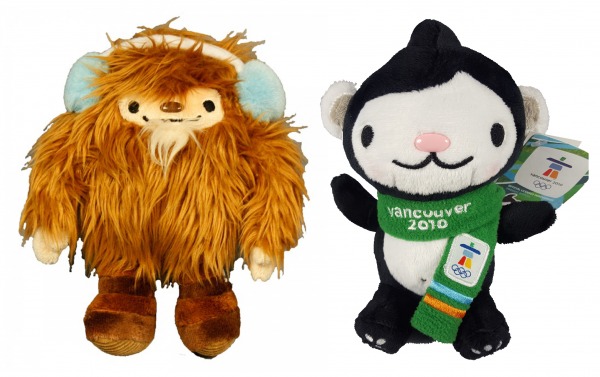
The two mascots for the 2010 Vancouver Games were inspired by the fauna and tales of the First Nations on the West Coast of Canada. Miga is a mythical sea bear, part killer whale and part spirit bear/Kermode which lives only on the coast of British Columbia. Quatchi is a sasquatch, which according to local legend lives in the forest.
Collection: Canada's Sports Hall of Fame
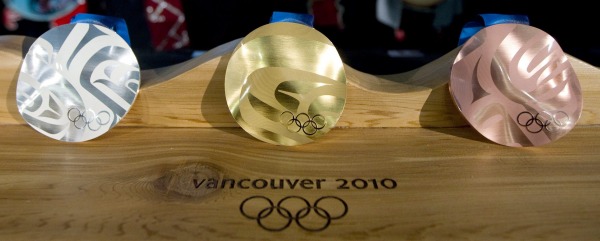
The design of the 2010 Olympic Winter Games medals was based on First Nations designs and had an undulating surface inspired by the snow, sea and natural environment of British Columbia. Each medal was unique and individually engraved by laser. They were produced by the Royal Canadian Mint and weighed between 500 to 576 grams.
Collection: The Canadian Press/Jonathan Hayward
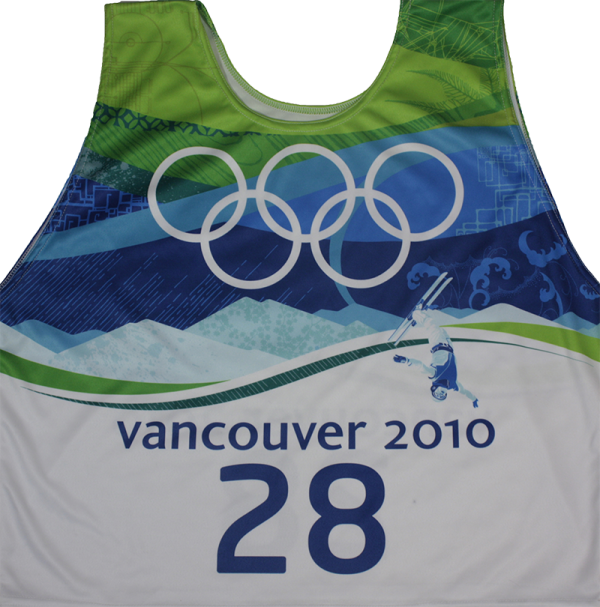
The race bib worn by competing athletes had the image of their sport. This bib was for freestyle aerials. The design theme for Vancouver reflected the colours seen in the environment, with blue for the sea and sky and green for the forest.
Collection: Private Collection: Claire Buffone-Blair
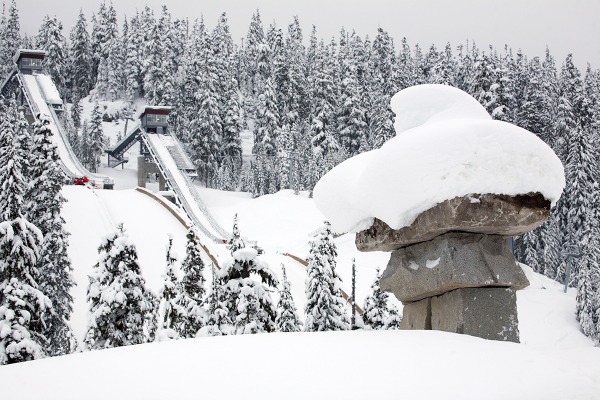
The venue for the ski jumping competition was at Whistler, B.C. The two jumps are for the small and large hills and the team competition. Each venue is tested at a World Cup or World Championship before the Olympic Games to ensure that the site and the staff are ready for competition.
Collection: Canada's Sports Hall of Fame
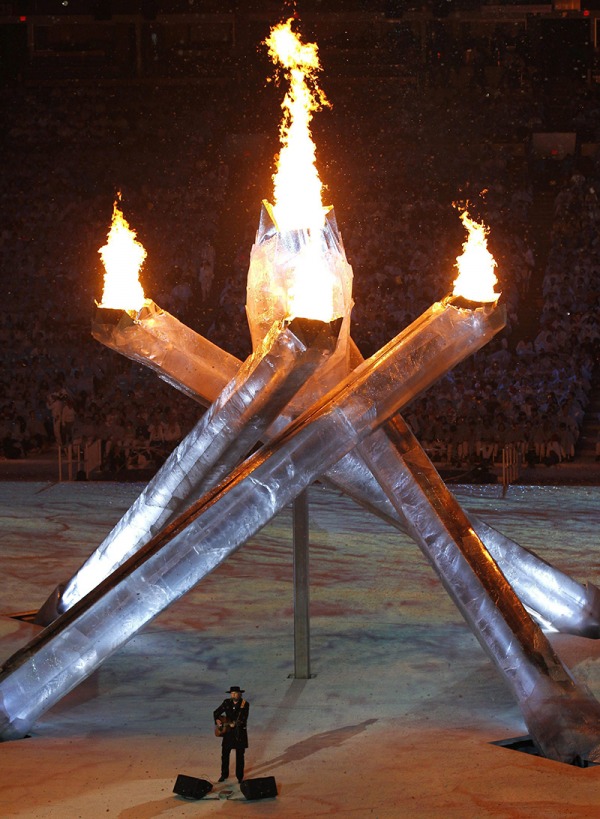
The Olympic Cauldron, which burned throughout the period of the 2010 Olympic Winter Games, was lit by five Canadian and Olympic athletes - Rick Hansen wheelchair athletics, Catriona Le May Doan speedskating, Nancy Greene alpine skiing, Steve Nash basketball and Wayne Gretzky ice hockey. The torch had been carried across Canada by 12,000 torchbearers.
Collection: THE CANADIAN PRESS/Nathan Denette
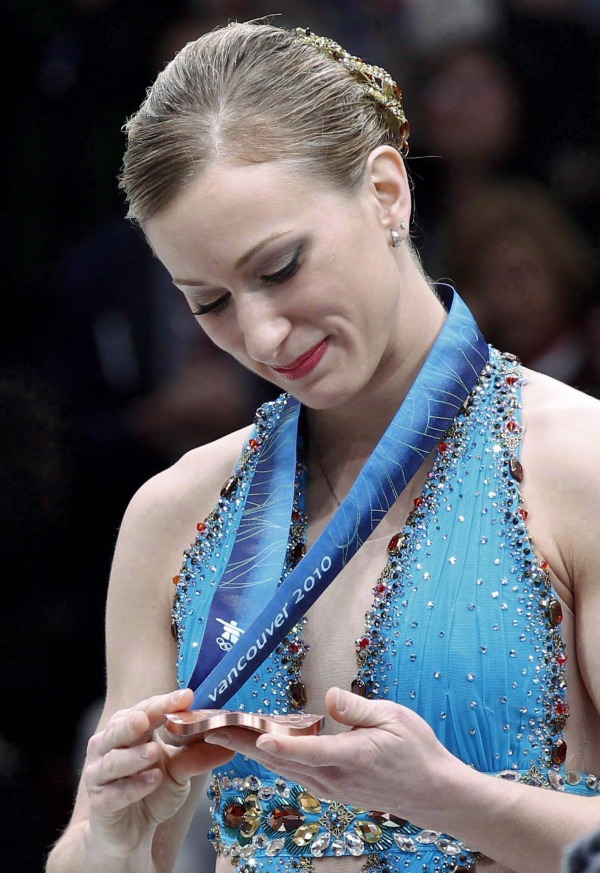
Joannie Rochette had dreamed of being an Olympian since she was a young girl and she accomplished that goal when she competed at the 2006 Olympic Winter Games in Torino. After her courageous skate in 2010 she was named co-recipient of the 2010 Terry Fox Award for her display of determination and humility in the face of adversity. She was honoured by being the flag-bearer at the closing ceremony.
Collection: THE CANADIAN PRESS/Paul Chiasson
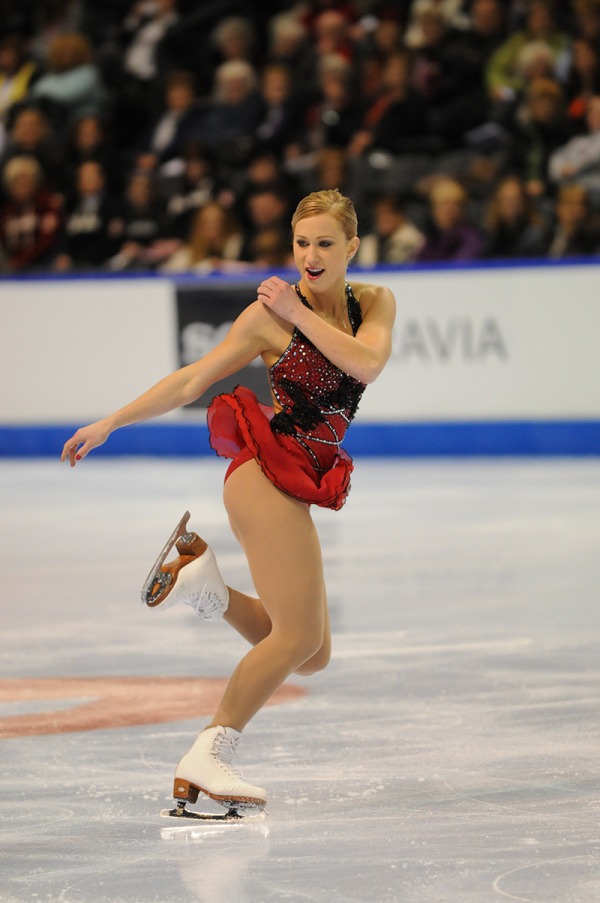
Joannie Rochette was known for her presence on the ice. She was a dynamic, powerful and musical performer. Her mother was her source of inspiration, pushing her to reach her full potential. Since her mother's death in 2010, which occurred two days before she was to compete in the women's figure skating event, Joannie has given back to her community by working in a campaign to raise awareness of heart disease in women.
Collection: Skate Canada/Stephan Potopnyk
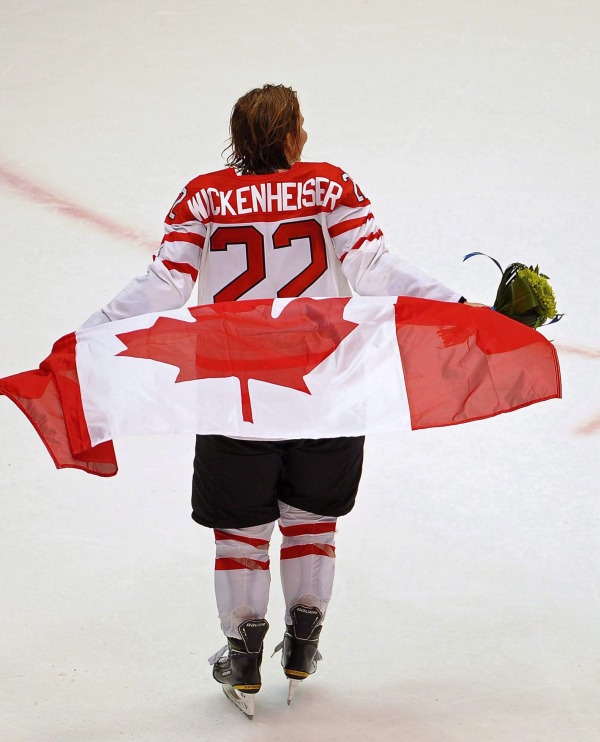
Hayley Wickenheiser was a lead player for Team Canada when they won their third Olympic gold medal in women's hockey. The team showed their collaboration and discipline and their winning attitude throughout the tournament. Women's hockey has become, since it's Olympic debut in 1998, one of the premier sports at the Olympic Winter Games, showing just how far it has come.
Collection: THE CANADIAN PRESS/Scott Gardner
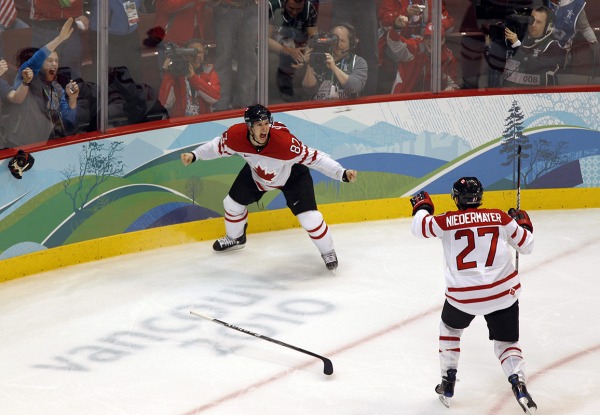
The iconic image for the 2010 Olympic Winter Games in Vancouver is that of Sidney Crosby celebrating his game winning goal during the overtime period, often called 'The Golden Goal'. The men's team had the eyes of an entire nation on them in the last game and they showed their strength and focus as a team throughout the entire game to win the gold medal.
Collection: THE CANADIAN PRESS/Paul Chiasson
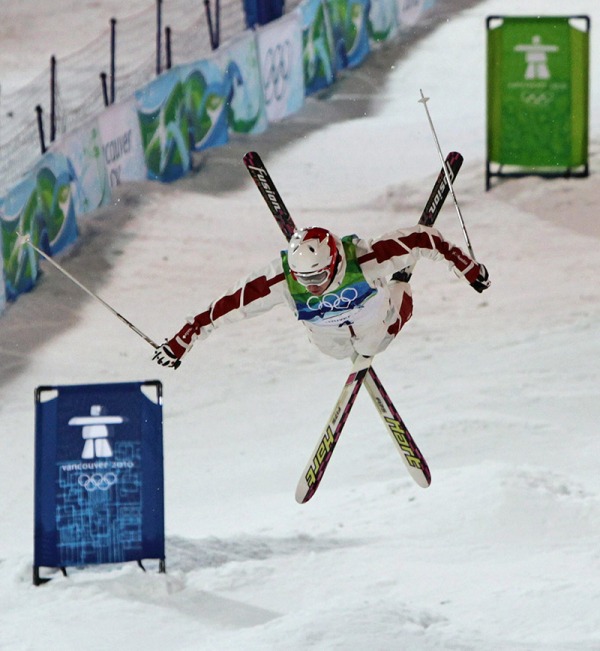
The moguls competition is a one timed run down a mound or mogul course. It is judged on technical turns, two aerial maneuvers and speed. Despite the intense pressure to win Canada's first ever gold medal at the Winter Olympic Games, Alexandre Bilodeau showed his focus by putting in the top run. Afterwards he and silver medallist Jenn Heil donated money to their favourite charities in order to give back to the community.
Collection: THE CANADIAN PRESS/Darryl Dyck
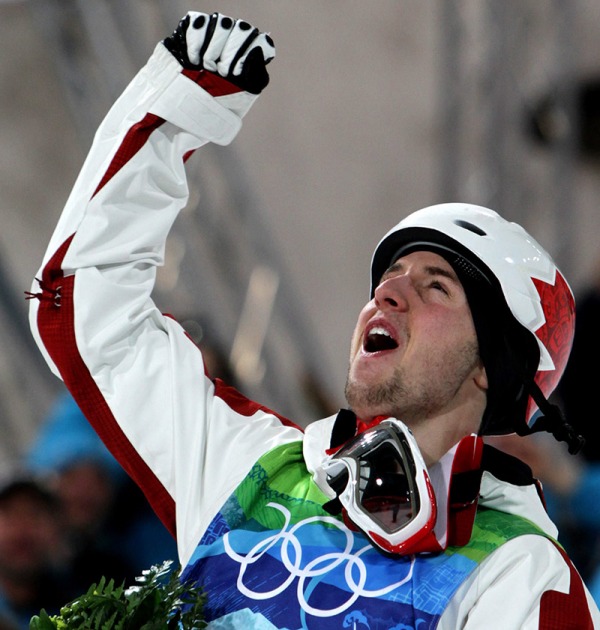
Alexandre was inspired by Jean-Luc Brassard, who won Canada's first gold medal in moguls at the 1994 Olympic Winter Games in Lillehammer, to take up moguls skiing. He repeated his Olympic victory at the 2014 Olympic Winter Games in Sochi, making him to the first Canadian male to win back to back gold medals. His passion and perseverance in his sport has left a strong legacy in moguls skiing.
Collection: THE CANADIAN PRESS/Seam Kilpatrick
Previous Next


